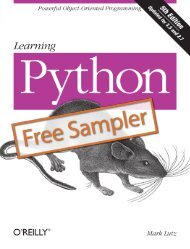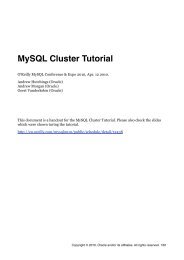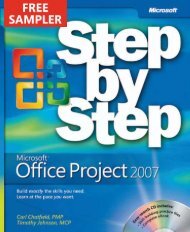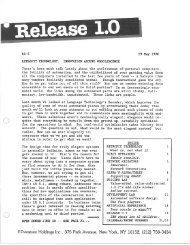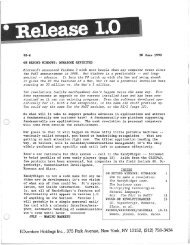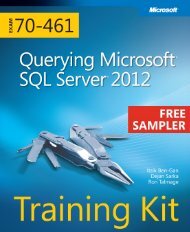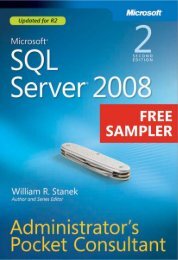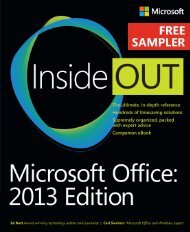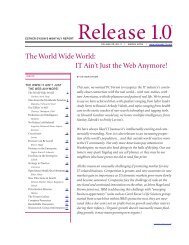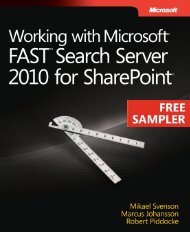23 September 1993 - Cdn.oreilly.com
23 September 1993 - Cdn.oreilly.com
23 September 1993 - Cdn.oreilly.com
You also want an ePaper? Increase the reach of your titles
YUMPU automatically turns print PDFs into web optimized ePapers that Google loves.
what net that is, we leave as an exercise for the reader). The argument is<br />
<strong>com</strong>pelling. If Telescript doesn't make it, the same functions will.<br />
Inspiration hit Jim White, Telescript's architect, in the late 1980s as he<br />
and others elaborated elements of the X.400 messaging and X.500 directoryservices<br />
standards. As they refined the protocols, White noticed that they<br />
might be answering the wrong question. Planning for all permutations was<br />
leading to a system with very smart (and <strong>com</strong>plex) servers, and very<br />
specific (and limited) client/server interfaces. Why not instead make the<br />
questions (and the messages they are carried in) a lot smarter? That would<br />
balance the system's intelligence between servers and clients.<br />
Take, for example, two hypothetical calendaring scenarios: one that includes<br />
new interoperability standards, but no Telescript (opposite), and<br />
another with Telescript-enabled services (below).<br />
Telescript is built around Agents and Places. The agents go places, and<br />
act on their creator's behalf. Telescript-enabled stationery is smart.<br />
Messages can include layout hints (portrait or landscape? where are the<br />
elements?), music or animation (imagine a line of animated greeting cards).<br />
Automatic RSVP buttons can post meetings to your calendar. Telescript messages<br />
also have authentication and permission to spend a certain budget on<br />
their owner's behalf.<br />
Telescript: Agent savant<br />
As denizens of ;Telescript-enabled platforms, Zoe, Phil, Juan and<br />
Alice have defined software agents that reflect their preferences and<br />
status, and are authorized do simple negotiations or spend a little<br />
money for approved purposes without consulting their owners directly.<br />
These agents inhabit a message center in the so-called network cloud.<br />
(Zoe and Juan have other agents that hang out in classified-ad markets,<br />
looking for good deals on antiques and collectibles; Phil has<br />
similar agents looking for parts for his 1954 Vincent Rapide motorcycle;<br />
Alice is living a life of voluntary simplicity and doesn't<br />
want anyone or anything helping her spend money -- her agent filters<br />
her mail.)<br />
To <strong>com</strong>pose her meeting request, Zoe converses with her "Let's Meet"<br />
agent, which is already aware of some of her preferences, but needs<br />
more details on this particular meeting. This agent was expensive<br />
(Zoe manages meetings for a living), so it knows a lot about meetings,<br />
and asks about, alternate times up front in case the first<br />
choice is unavailable. It also asks who the key participants are,<br />
and a few other questions. It doesn't put Zoe through every possible<br />
<strong>com</strong>bination, though; that would be bothersome and inefficient.<br />
Zoe sends her agent off to rendezvous with the other agents representing<br />
other potential participants. Much, perhaps not all, of the<br />
negotiating can occur right away, between the agents. Note that<br />
Zoe's smart agent can talk to other, dumber agents (as in real life).<br />
Also, the network (public or enterprise) is no longer just a pipe; it<br />
be<strong>com</strong>es a platform for distributed, <strong>com</strong>municating applications.<br />
Release 1.0<br />
19<br />
<strong>23</strong> <strong>September</strong> <strong>1993</strong>



